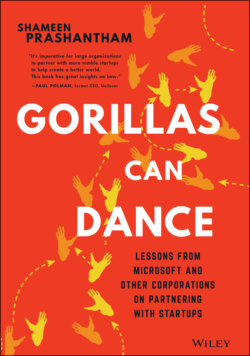Читать книгу Gorillas Can Dance - Shameen Prashantham - Страница 19
Partnering with Social Ventures
ОглавлениеIn February 2020, the Microsoft Global Social Entrepreneurship Program, a new global initiative specifically targeted at social entrepreneurs, was launched. My account of Microsoft's startup partnering journey concludes with this announcement by Jean-Philippe Courtois,47 EVP and president, Microsoft Global Sales, Marketing, and Operations, warranting a final observation regarding social impact.
Even prior to the formal launch of this new initiative, social enterprises had appeared on the corporation's radar.48 This was evident during my research field trips to Africa. The Microsoft4Afrika initiative had been an avenue through which Microsoft was engaging with African startups, as I learned from Muhammad Nabil, the then head of ISVs and Startups Recruitment. These included social enterprises. During a field visit to Kenya – where Nadella had launched Windows 10 – I learned about Microsoft's efforts to partner with Twiga Foods, a social enterprise that was linking traditional fruit growers with retail outlets, and was using Azure technology.
Microsoft had engaged with social enterprises in other regions as well, such as the Indian subcontinent. To illustrate, Sehat Kahani is a Pakistani startup founded by Dr. Sara Saeed (CEO) and Dr. Iffat Zaffar (COO) that uses telemedicine to provide remote medical advice to patients while at the same time tapping the underutilized capacities of women doctors. In part through partnering with Microsoft,49 this social enterprise was able to scale its mobile app and gain traction owing to the Covid-19 pandemic, which greatly increased the need for telemedicine.
Through its Global Social Entrepreneurship Program, Microsoft would partner with social enterprises around the world that used Azure “to help create a sustainable, accessible and equitable world”50 by offering Microsoft Philanthropies grants, connections to other organizations, go-to-market support, and free access to Microsoft technologies including $120,000 of free Azure cloud and $1,000/month of GitHub Enterprise.51 Shaloo Garg, Global Lead, Global Microsoft Social Entrepreneurship Program, stated, “Our #1 operating principle for this program is simple. We want ‘Founders’ to be the center and their success is what drives us. When we designed this program, our key driver was to offer core components like Technology, Grants, Corporate Innovation (co-sell to enterprise customers) to help drive startup success. And we are absolutely jazzed about it.”
Three startups were announced as the initial participants: OmniVis, which had built a smartphone-based cholera detection system; Seabin, which tackles marine litter such as microplastics; and Zindi, which generates AI solutions for Africa through its web platform.52 Success would be measured both by profitability and social impact, including commitment to the ethical and responsible use of AI.53
Potentially, initiatives such as Microsoft's social entrepreneurship program have an important role to play in the post-pandemic 2020s decade as the world economy rebuilds and resumes its efforts to achieve the 2030 Sustainable Development Goals.54
